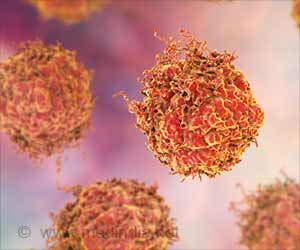Learn about how monoclonal B-cell lymphocytosis is linked to an elevated risk of skin cancer and other cancers.

‘Individuals with the pre-cancerous stage of #monoclonal B-cell #lymphocytosis (MBL) face a 92% increased risk of developing #melanoma. #medindia
’





Mayo Clinic researchers have published the findings in the Journal of Clinical Oncology(1✔ ✔Trusted SourceRisk of Incident Melanoma Among Individuals With Low-count monoclonal B-cell lymphocytosis
Go to source).
This research is the first to demonstrate that individuals in the pre-cancerous stage of monoclonal B-cell lymphocytosis have a 92% increased risk of developing melanoma.
Monoclonal B-cell Lymphocytosis and Chronic Lymphocytic Leukemia
People with MBL have a range of defective lymphocytes. An earlier study has linked chronic lymphocytic leukemia (CLL), a form of cancer of the bone marrow and blood, to MBL. People with CLL face an increased risk of melanoma.The risk of melanoma observed in individuals with monoclonal B-cell lymphocytosis is comparable to that of patients with chronic lymphocytic leukemia.
The findings suggest that having MBL, even at low levels, can serve as a biological signal, or biomarker, for early detection of melanoma, which is increasing worldwide.
Advertisement
The researchers have now followed these individuals for about four years and are finding a collection of potentially related diagnoses among those who screened positive for MBL.
"Previously, scientists would equate MBL as just a part of the aging process. What we're seeing, though, is there are clinical consequences to having MBL — contracting serious infections and melanoma are some of them," Dr. Slager says.
Advances in flow cytometry, a high-resolution technology that enables researchers to look at cells in the blood and identify their varied physical characteristics, have helped propel this research.
Clinicians and researchers can now identify people with MBL, the precursor to CLL, more easily.
People with CLL have a very high number of these identical circulating lymphocytes: more than 5,000 lymphocytes per microliter (A microliter is about 1/50th of a drop of blood).
That's compared to a person with MBL, who typically has 1-5 of these circulating lymphocytes per microliter of blood. Through more sensitive flow cytometry, scientists can identify people earlier when their levels are still low.
"The risk of melanoma seems to be the same no matter how many of these cloned lymphocytes are in the blood, suggesting that just having a clonal population of these lymphocytes — meaning, having MBL— increases your risk of getting melanoma," she says.
Skin Cancer Prevention for monoclonal B-cell lymphocytosis Patients
Patients with CLL are encouraged to get annual skin cancer screenings by a dermatologist and to protect their skin from sun exposure to prevent melanoma."Our findings suggest that people with the precursor MBL stage should also be more diligent about following the established guidelines for skin cancer prevention including, for example, use of sunscreen and protective clothing," Dr. Slager says.
One of the questions Dr. Slager's team plans to explore next is whether there is a genetic overlap between MBL, CLL, and melanoma. One hypothesis is that inheriting a genetic variant that increases the risk of MBL and CLL may also increase the risk of melanoma.
Another area the researchers are investigating is whether MBL impacts the clinical outcome among people with melanoma, including if having both MBL and melanoma reduces one's overall survival or affects a person's response to therapy.
Reference:
- Risk of Incident Melanoma Among Individuals With Low-Count Monoclonal B-Cell Lymphocytosis - (https:ascopubs.org/doi/10.1200/JCO.24.00332)
Source-Eurekalert













